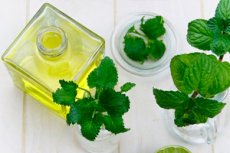Medical expert of the article
New publications
Preparations
Oils for nasal polyps
Last reviewed: 08.07.2025

All iLive content is medically reviewed or fact checked to ensure as much factual accuracy as possible.
We have strict sourcing guidelines and only link to reputable media sites, academic research institutions and, whenever possible, medically peer reviewed studies. Note that the numbers in parentheses ([1], [2], etc.) are clickable links to these studies.
If you feel that any of our content is inaccurate, out-of-date, or otherwise questionable, please select it and press Ctrl + Enter.

Vegetable oils have proven themselves to be effective against nasal polyps. They are used to lubricate the nasal cavity and rinse the nose. To lubricate the nasal cavity, a cotton swab is soaked in a small amount of oil. You can put the cotton wool in the nasal cavity for 15-20 minutes and then pull it out. You can simply intensively lubricate the nasal cavity with oil. Lubrication is carried out several times a day. The optimal option is lubrication 5-6 times a day.
To prepare a decoction for rinsing and washing, dissolve a tablespoon of oil in a glass of warm water. Rinsing is done 3-4 times a day.
Grape seed oil, sea buckthorn, peach and apricot oils have proven themselves to be effective against polyps. Coconut oil, shea butter and karite can be used to lubricate the nasal cavity. Cocoa butter, pre-melted in a water bath, can be used.
Essential oil can be added to the base oil. It should be used 1-2 drops, no more. In addition, it should never be used in pure, undiluted form, as it can cause a burn of the mucous membrane. It is very concentrated.
Of the essential oils, eucalyptus, fir, thuja, cypress, and juniper oils have proven themselves well. Any coniferous oil will have a positive effect. Lemon and citrus oils have an antibacterial effect. But you need to be careful with citrus, as it can cause allergies.
Celandine oil for nasal polyps
Celandine is an excellent antiseptic that prevents the growth and reproduction of bacterial and viral microflora. All parts of the plant are poisonous, so it should be taken with extreme caution, observing all necessary precautions, adhering to the recommended treatment regimen and dosage.
Delays the growth of some malignant tumors. Promotes the resorption of small polyps and neoplasms. Reduces and soothes pain, removes warts, calluses. Prevents cramps, spasms.
The decoction is used both externally and internally. Externally, a decoction of their roots is used. It is used for medicinal baths, washings, lotions. The juice is used to cauterize polyps, neoplasms, warts. Promotes their resorption. Can be used instead of iodine for cuts.
Thuja oil for nasal polyps
Thuja oil has proven itself as a means of promoting the resorption of polyps and other neoplasms. It has anti-inflammatory, anti-infective action. Normalizes cellular metabolism, stabilizes cell membranes.
The oil can be base, fatty, or essential. It is important to understand that essential oil is concentrated and cannot be taken in pure, undiluted form. Essential oil is dissolved in any vegetable, fatty oil. The ideal base would be avocado, jojoba, grape seed oil. Even regular olive oil will do. If the thuja oil is base, fatty, it does not need to be diluted.
It is used to lubricate the nasal cavity. Cotton swabs soaked in oil can be placed in the nose.
Sea buckthorn oil for nasal polyps
Sea buckthorn oil has long been used to treat various inflammatory and infectious diseases. It has the ability to stimulate cell and tissue regeneration, which is why it quickly heals wounds, erosions, and cuts. It promotes the resorption of seals, bruises, and neoplasms.
It is used to lubricate the nasal cavity and the polyp itself. Turunts soaked in oil can be used. The oil is also used to rinse the nose. To do this, a tablespoon of oil is dissolved in a glass of warm water, mixed thoroughly, and used warm.
For internal use, you can use the oil in the form of tea. For this, prepare regular tea. Before drinking, add a tablespoon of oil, a slice of lemon and honey to taste. Stir thoroughly, leave for 5 minutes, then start drinking. It is better to drink such a decoction at night.
Attention!
To simplify the perception of information, this instruction for use of the drug "Oils for nasal polyps" translated and presented in a special form on the basis of the official instructions for medical use of the drug. Before use read the annotation that came directly to medicines.
Description provided for informational purposes and is not a guide to self-healing. The need for this drug, the purpose of the treatment regimen, methods and dose of the drug is determined solely by the attending physician. Self-medication is dangerous for your health.

